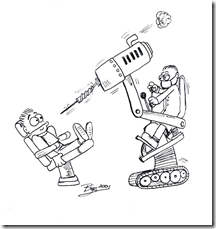The pre-gifting of the stuffed unicorn as a reward for the excellent behavior that we expected from my daughter during her recent dentist appointment was a stroke of genius on my wife’s part because of the nature of loss aversion.
In economics, loss aversion refers to people's tendency to strongly prefer avoiding losses to acquiring gains. Studies suggest that losses are twice as powerful, psychologically, as gains. The unexpected loss of $100 is significantly more painful than the joy of suddenly finding $100.
This tendency has been demonstrated again and again across cultures in a wide range of contexts.
But how often do we ever take advantage of this tendency?
As a teacher and parent, I normally establish an expectation and an associated reward, and only when that expectation is met does the child receive the reward.
Complete your chores and receive your allowance.
Write an essay that meets my requirements and receive an A+.
Work hard all week and behave well and you can eat lunch in the classroom on Friday.
But my wife flipped that paradigm in an effort to get my daughter to sit in the dentist chair and allow the dentist to do her work. She pre-rewarded Clara with a toy and the knowledge that if she did not behave well, the toy would be taken away.
She utilized Clara’s tendency toward loss aversion to change a behavior, and it worked beautifully. Clara refused the fluoride and balked at the flossing, but she sat more patiently than ever before.


Could parents and teachers do this more often when attempting to change the behavior of children?
Here is your allowance. You’ll need to pay me back at the end of the week if you don’t finish all of your chores.
I’ve entered an A+ in my grade book for the essay that I am assigning to you. If you complete the essay on time and meet all of my expectations, that A+ will remain.
I’ve planned for you to eat lunch in the classroom on Friday unless your effort or behavior cause you to lose this privilege.
Should parents and teachers be utilizing loss aversion more often?
Could employers find ways of utilizing loss aversion to improve employee performance and production?
I think so. With four months left in the school year and a lifetime of parenting ahead of me, let the experimenting begin.




